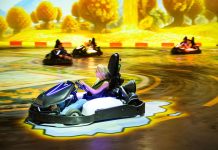Mud kitchens are fun pieces of equipment placed into an outdoor space, and used for messy play by any age of children, but usually those in the early years category.
Whilst you get offered your fifth mud pie of the morning from your adorable grinning toddler, it’s not difficult to see that mud kitchens are fun for them. What you may not know is that these amazing toys actively help children to learn too, so they can progress and develop, all whilst they cook up a storm.
“Children still need a childhood with dirt, mud, puddles, trees, sticks and tadpoles.” – Brook Hampton
Mud Kitchen Play: Endless Opportunities For Fun
A mud kitchen is a homemade, or professionally made piece of play equipment that looks like a small kitchen. Usually there is a work surface, a ‘washing up bowl’, and lots of accessories like wooden spoons, baking trays and wooden or plastic food items. Children can add leaves, mud, water and sand to their ‘recipes’, mixing and squeezing the contents, pretending to make all kinds of pretend foods that they will no doubt show you and ask you to taste (we don’t recommend the specials in this particular restaurant!).
How Mud Kitchens Help Children To Learn
Mud kitchens make for hours and hours of fun at home, or in educational facilities like nurseries. They also create a vast amount of opportunities for children to learn as they play, here’s how:
Independence
Children are able to learn how to be independent with mud kitchen play, looking around for ‘ingredients’ for their recipes, and exploring their surroundings. In this scenario, whilst they are supervised, they are largely in charge of how they play and what they do, compared to being the helper in situations like baking inside with parents. This is a great start to encouraging their sense of independence, to benefit various areas of their development.
Creative Thinking
In a mud kitchen, a child’s imagination enables them to turn everything into anything they want because their creativity is running totally free. Twigs are utensils, stones are ingredients, dandelion flowers are artisan tea.
Role play is also explored in endless ways. They are dinosaurs foraging for ingredients for their dinosaur babies, they are alien creatures making mud pies to sling at enemies, they are their parents discussing the plans for the weekend – everything and anything goes.
As they share those ideas with their caregivers, their communication skills are also enhanced and practised.
An Interest In Nature & The World Around Them
Spending time in nature helps children to get lots of fresh air, to build confidence, spend time away from screens and fully run free. Mud kitchens encourage that outdoor time, giving a starting point and core feature of interest and inspiration to an outdoor space that may otherwise be a little daunting for a young child.
Language & Maths
During mud kitchen play children are looking at ‘food’ labels and using language for role play, associating words with different shapes and items, creating their own ‘recipes’ and ‘menus’ on chalkboards, and hearing language used by caregivers and other children. Kids can also start to recognise basic maths concepts by using measuring jugs, counting ingredients that go into their recipes, and with ‘messy maths challenges’ that kids of any age can enjoy.
Safe Exploration Of Emotions & Feelings
With role play in a mud kitchen children can safely express how they feel, and they can act out a wide range of emotions in a situation where they are totally in control. They can also start to show empathy by ‘being in another’s shoes’, learning to understand how others may feel.
Development Of Social Skills
With mud kitchen play children are learning to share with other children, and to communicate with caregivers who are playing with them. They also have to learn to share equipment, and are able to play out different social roles as they engage in creative play.
Physical Development
Mud kitchens present a wealth of opportunities for movement, whether that is through squeezing and picking up sand or mud to aid fine motor skills, or crouching and picking up buckets of water, pouring water into other containers and using various muscles to balance without spilling the water. Children are moving in various ways to utilise the mud kitchen equipment, learning how to use their bodies more effectively, connecting it to the world around them and getting in their three hours a day of physical activity (recommended by the NHS for those under 5).
Is Your Outdoor Space Perfect For A Mud Kitchen?
Whether you are an educational facility for young kids, or a parent with an energetic toddler, a mud kitchen is a fantastic addition to any outdoor space. Do be sure to invest in professional, well-made equipment that can withstand the vigour and battering of toddler play and UK weather, so that kids get to play safely, and the equipment lasts.
With the addition of a strong and sturdy mud kitchen to your outdoor play area, the children in your care can enjoy learning, laughing and making memories hour after hour in the fresh air.







